人教新目标版英语八年级上册 Unit 9Can you come to my party导学案
文档属性
| 名称 | 人教新目标版英语八年级上册 Unit 9Can you come to my party导学案 | 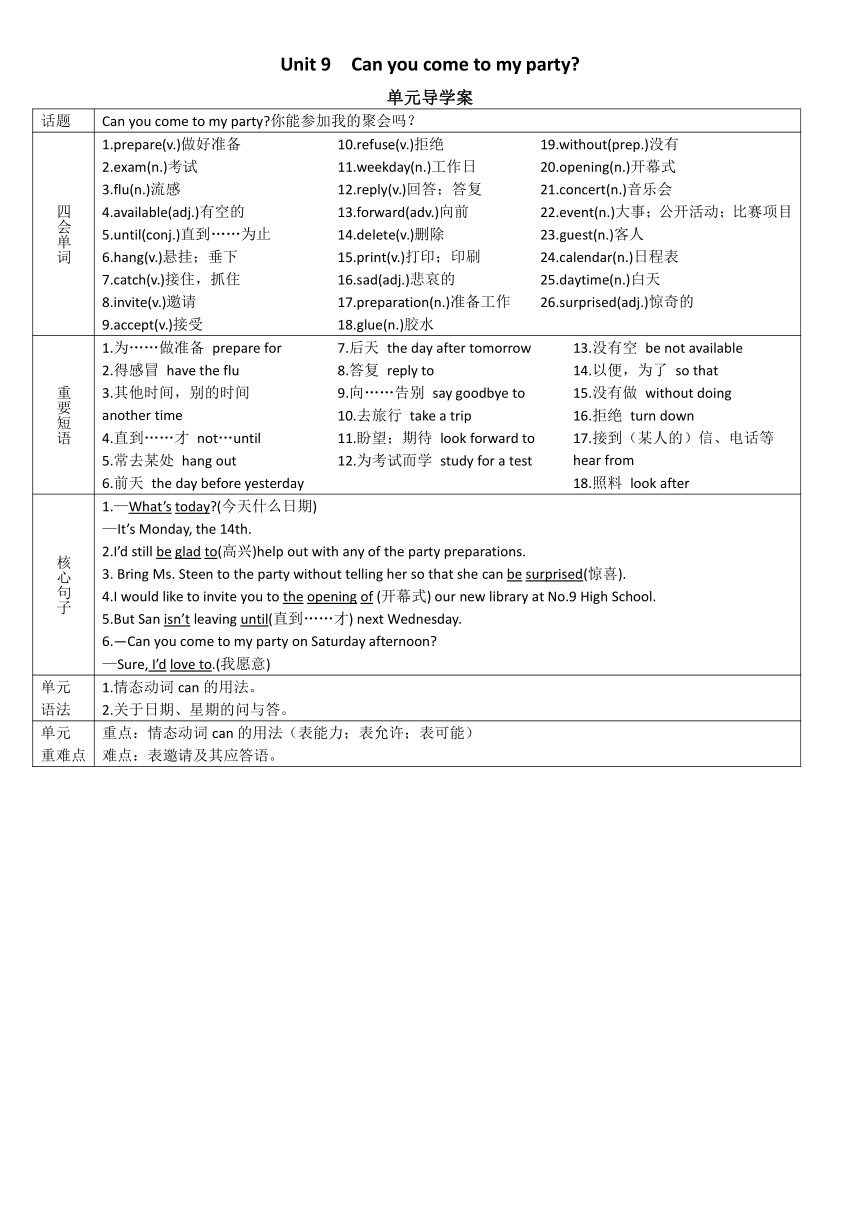 | |
| 格式 | doc | ||
| 文件大小 | 142.2KB | ||
| 资源类型 | 教案 | ||
| 版本资源 | 人教新目标(Go for it)版 | ||
| 科目 | 英语 | ||
| 更新时间 | 2023-07-05 17:12:06 | ||
图片预览

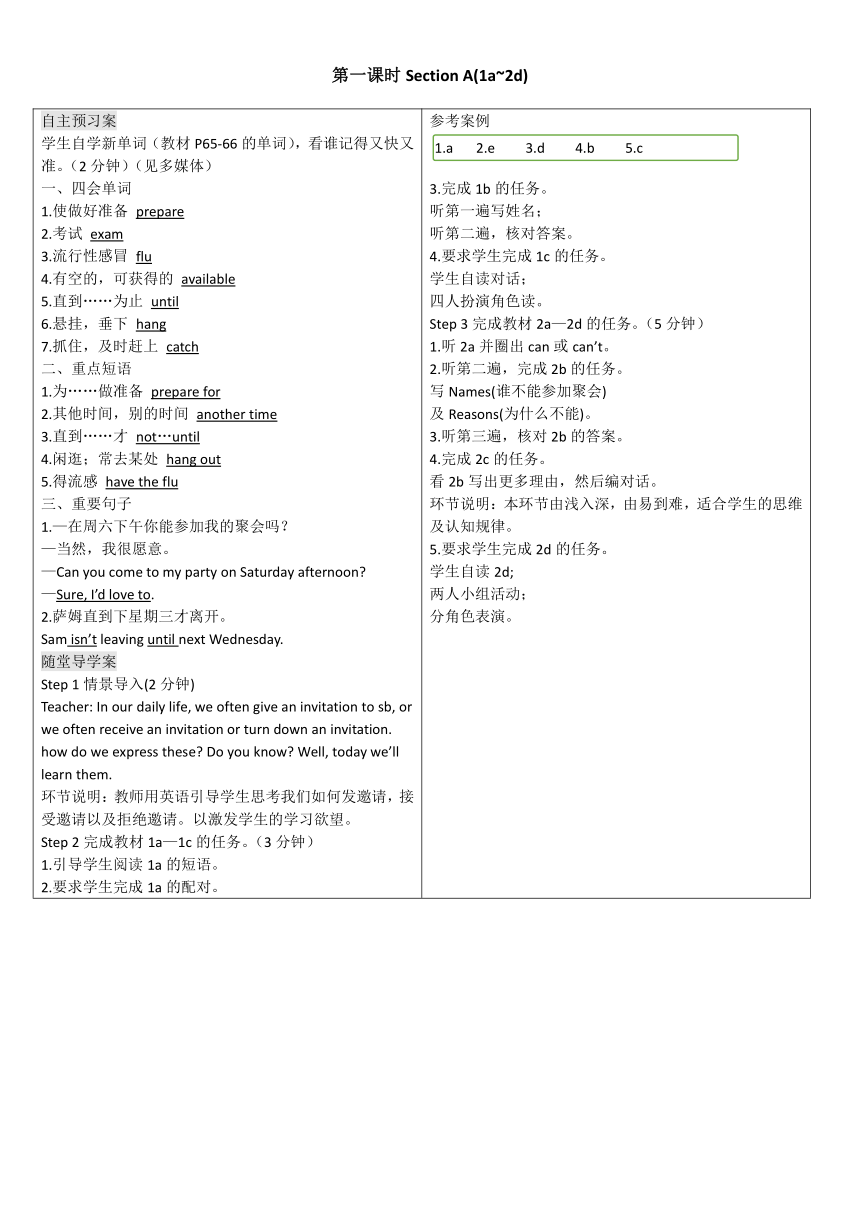
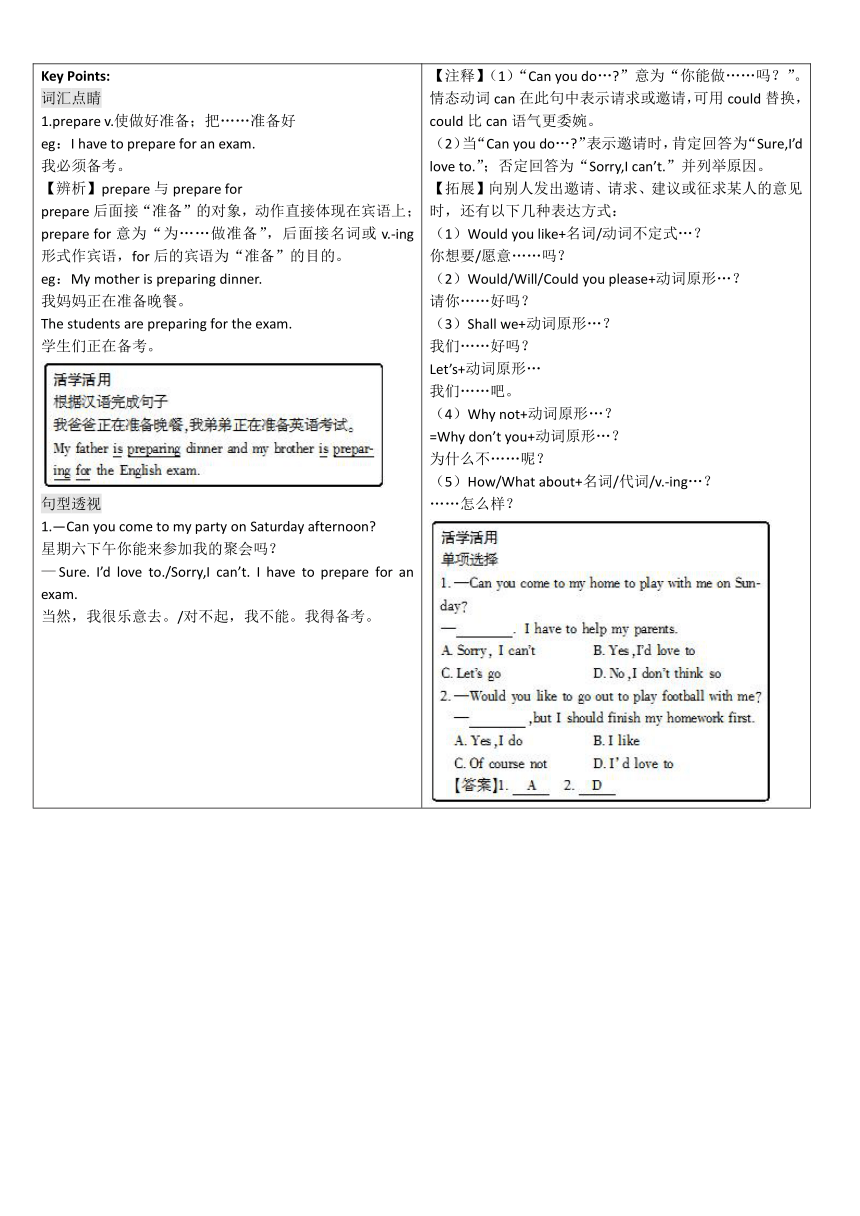
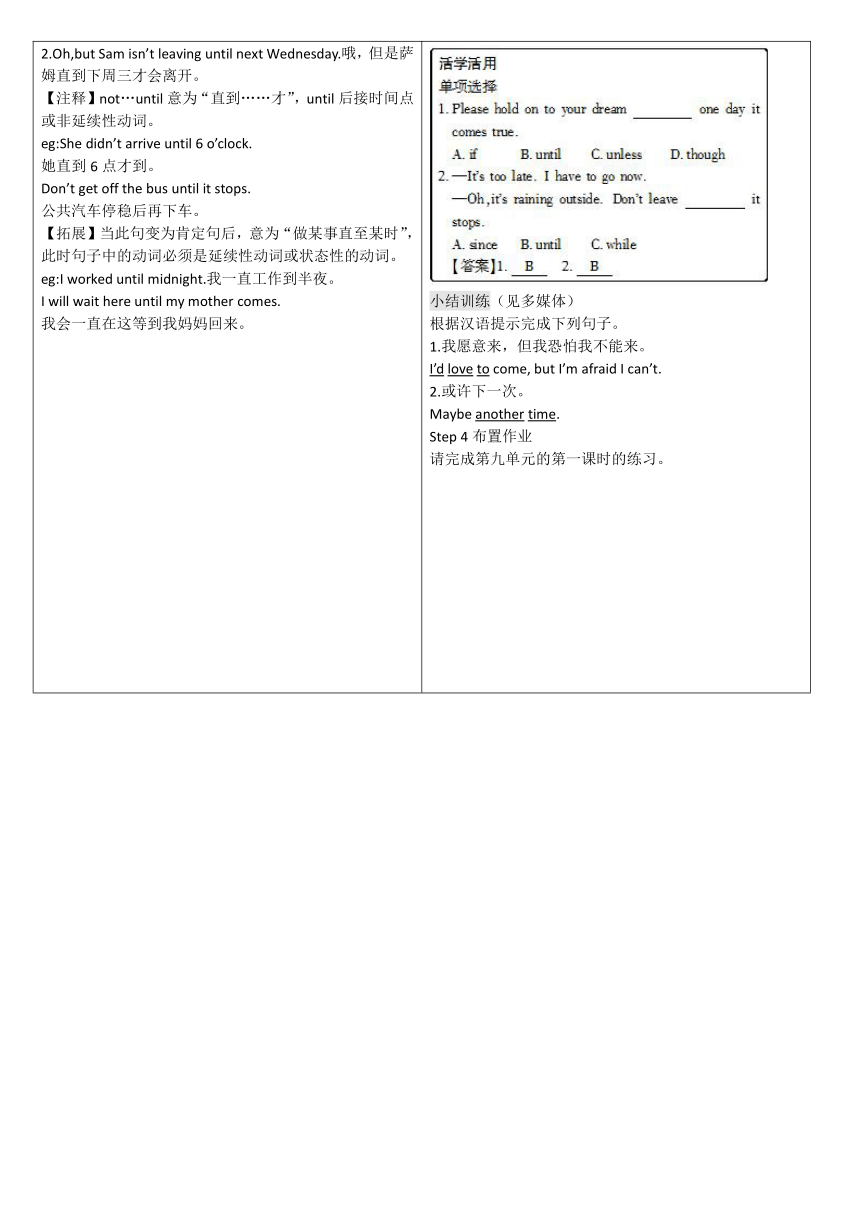
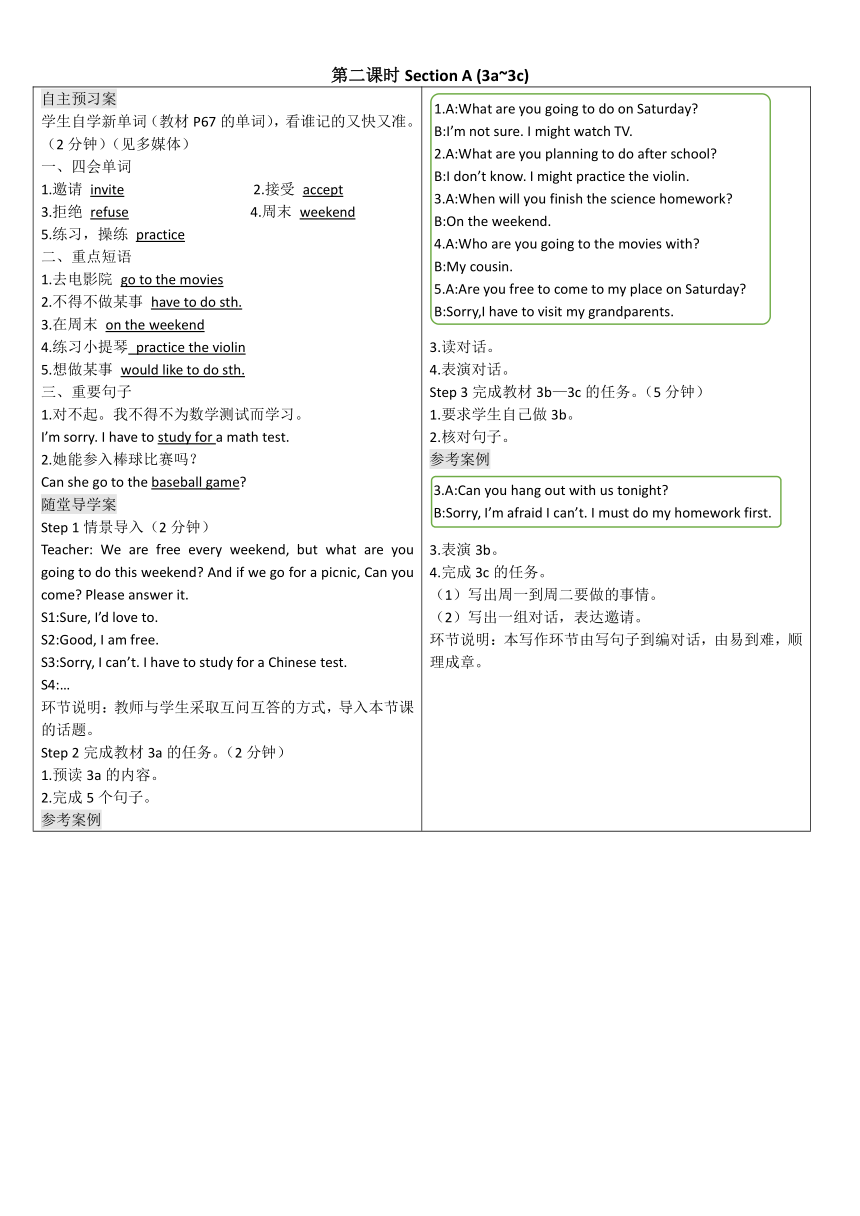
文档简介
Unit 9 Can you come to my party
单元导学案
话题 Can you come to my party 你能参加我的聚会吗?
四会单词 1.prepare(v.)做好准备 2.exam(n.)考试 3.flu(n.)流感 4.available(adj.)有空的 5.until(conj.)直到……为止 6.hang(v.)悬挂;垂下 7.catch(v.)接住,抓住 8.invite(v.)邀请 9.accept(v.)接受 10.refuse(v.)拒绝 11.weekday(n.)工作日 12.reply(v.)回答;答复 13.forward(adv.)向前 14.delete(v.)删除 15.print(v.)打印;印刷 16.sad(adj.)悲哀的 17.preparation(n.)准备工作 18.glue(n.)胶水 19.without(prep.)没有 20.opening(n.)开幕式 21.concert(n.)音乐会 22.event(n.)大事;公开活动;比赛项目 23.guest(n.)客人 24.calendar(n.)日程表 25.daytime(n.)白天 26.surprised(adj.)惊奇的
重要短语 1.为……做准备 prepare for 2.得感冒 have the flu 3.其他时间,别的时间 another time 4.直到……才 not…until 5.常去某处 hang out 6.前天 the day before yesterday 7.后天 the day after tomorrow 8.答复 reply to 9.向……告别 say goodbye to 10.去旅行 take a trip 11.盼望;期待 look forward to 12.为考试而学 study for a test 13.没有空 be not available 14.以便,为了 so that 15.没有做 without doing 16.拒绝 turn down 17.接到(某人的)信、电话等 hear from 18.照料 look after
核心句子 1.—What’s today (今天什么日期) —It’s Monday, the 14th. 2.I’d still be glad to(高兴)help out with any of the party preparations. 3. Bring Ms. Steen to the party without telling her so that she can be surprised(惊喜). 4.I would like to invite you to the opening of (开幕式) our new library at No.9 High School. 5.But San isn’t leaving until(直到……才) next Wednesday. 6.—Can you come to my party on Saturday afternoon —Sure, I’d love to.(我愿意)
单元 语法 1.情态动词can的用法。 2.关于日期、星期的问与答。
单元 重难点 重点:情态动词can的用法(表能力;表允许;表可能) 难点:表邀请及其应答语。
第一课时Section A(1a~2d)
自主预习案 学生自学新单词(教材P65-66的单词),看谁记得又快又准。(2分钟)(见多媒体) 一、四会单词 1.使做好准备 prepare 2.考试 exam 3.流行性感冒 flu 4.有空的,可获得的 available 5.直到……为止 until 6.悬挂,垂下 hang 7.抓住,及时赶上 catch 二、重点短语 1.为……做准备 prepare for 2.其他时间,别的时间 another time 3.直到……才 not…until 4.闲逛;常去某处 hang out 5.得流感 have the flu 三、重要句子 1.—在周六下午你能参加我的聚会吗? —当然,我很愿意。 —Can you come to my party on Saturday afternoon —Sure, I’d love to. 2.萨姆直到下星期三才离开。 Sam isn’t leaving until next Wednesday. 随堂导学案 Step 1情景导入(2分钟) Teacher: In our daily life, we often give an invitation to sb, or we often receive an invitation or turn down an invitation. how do we express these Do you know Well, today we’ll learn them. 环节说明:教师用英语引导学生思考我们如何发邀请,接受邀请以及拒绝邀请。以激发学生的学习欲望。 Step 2完成教材1a—1c的任务。(3分钟) 1.引导学生阅读1a的短语。 2.要求学生完成1a的配对。 参考案例 (
1.a
2.e
3.d
4.b
5.c
) 3.完成1b的任务。 听第一遍写姓名; 听第二遍,核对答案。 4.要求学生完成1c的任务。 学生自读对话; 四人扮演角色读。 Step 3完成教材2a—2d的任务。(5分钟) 1.听2a并圈出can或can’t。 2.听第二遍,完成2b的任务。 写Names(谁不能参加聚会) 及Reasons(为什么不能)。 3.听第三遍,核对2b的答案。 4.完成2c的任务。 看2b写出更多理由,然后编对话。 环节说明:本环节由浅入深,由易到难,适合学生的思维及认知规律。 5.要求学生完成2d的任务。 学生自读2d; 两人小组活动; 分角色表演。
Key Points: 词汇点睛 1.prepare v.使做好准备;把……准备好 eg:I have to prepare for an exam. 我必须备考。 【辨析】prepare与prepare for prepare后面接“准备”的对象,动作直接体现在宾语上;prepare for意为“为……做准备”,后面接名词或v.-ing形式作宾语,for后的宾语为“准备”的目的。 eg:My mother is preparing dinner. 我妈妈正在准备晚餐。 The students are preparing for the exam. 学生们正在备考。 句型透视 1.—Can you come to my party on Saturday afternoon 星期六下午你能来参加我的聚会吗? —Sure. I’d love to./Sorry,I can’t. I have to prepare for an exam. 当然,我很乐意去。/对不起,我不能。我得备考。 【注释】(1)“Can you do… ”意为“你能做……吗?”。情态动词can在此句中表示请求或邀请,可用could替换,could比can语气更委婉。 (2)当“Can you do… ”表示邀请时,肯定回答为“Sure,I’d love to.”;否定回答为“Sorry,I can’t.”并列举原因。 【拓展】向别人发出邀请、请求、建议或征求某人的意见时,还有以下几种表达方式: (1)Would you like+名词/动词不定式…? 你想要/愿意……吗? (2)Would/Will/Could you please+动词原形…? 请你……好吗? (3)Shall we+动词原形…? 我们……好吗? Let’s+动词原形… 我们……吧。 (4)Why not+动词原形…? =Why don’t you+动词原形…? 为什么不……呢? (5)How/What about+名词/代词/v.-ing…? ……怎么样?
2.Oh,but Sam isn’t leaving until next Wednesday.哦,但是萨姆直到下周三才会离开。 【注释】not…until意为“直到……才”,until后接时间点或非延续性动词。 eg:She didn’t arrive until 6 o’clock. 她直到6点才到。 Don’t get off the bus until it stops. 公共汽车停稳后再下车。 【拓展】当此句变为肯定句后,意为“做某事直至某时”,此时句子中的动词必须是延续性动词或状态性的动词。 eg:I worked until midnight.我一直工作到半夜。 I will wait here until my mother comes. 我会一直在这等到我妈妈回来。 小结训练(见多媒体) 根据汉语提示完成下列句子。 1.我愿意来,但我恐怕我不能来。 I’d love to come, but I’m afraid I can’t. 2.或许下一次。 Maybe another time. Step 4布置作业 请完成第九单元的第一课时的练习。
第二课时Section A (3a~3c)
自主预习案 学生自学新单词(教材P67的单词),看谁记的又快又准。(2分钟)(见多媒体) 一、四会单词 1.邀请 invite 2.接受 accept 3.拒绝 refuse 4.周末 weekend 5.练习,操练 practice 二、重点短语 1.去电影院 go to the movies 2.不得不做某事 have to do sth. 3.在周末 on the weekend 4.练习小提琴 practice the violin 5.想做某事 would like to do sth. 三、重要句子 1.对不起。我不得不为数学测试而学习。 I’m sorry. I have to study for a math test. 2.她能参入棒球比赛吗? Can she go to the baseball game 随堂导学案 Step 1情景导入(2分钟) Teacher: We are free every weekend, but what are you going to do this weekend And if we go for a picnic, Can you come Please answer it. S1:Sure, I’d love to. S2:Good, I am free. S3:Sorry, I can’t. I have to study for a Chinese test. S4:… 环节说明:教师与学生采取互问互答的方式,导入本节课的话题。 Step 2完成教材3a的任务。(2分钟) 1.预读3a的内容。 2.完成5个句子。 参考案例 (
1.A:What are you going to do on Saturday
B:I
’
m not sure.
I might watch TV.
2.A:What are you planning to do after school
B:I don
’
t know.
I might practice the violin.
3.A:When will you finish the science homework
B:On the weekend.
4.A:Who are you going to the movies with
B:My cousin.
5.A:Are you free to come to my place on Saturday
B:Sorry,I have to visit my grandparents.
) 3.读对话。 4.表演对话。 Step 3完成教材3b—3c的任务。(5分钟) 1.要求学生自己做3b。 2.核对句子。 参考案例 (
3.A:Can you hang out with us tonight
B:Sorry,
I
’
m afraid I can
’
t.
I must do my homework first.
) 3.表演3b。 4.完成3c的任务。 (1)写出周一到周二要做的事情。 (2)写出一组对话,表达邀请。 环节说明:本写作环节由写句子到编对话,由易到难,顺理成章。
Key Points: 词汇点睛 1.accept v.接受 【辨析】accept与receive 两词都有“收到”之意,但有所区别: receive通常指被动地“收到”或“接到”,而accept则指主动地“接受”。 eg:She received his present, but she didn’t accept it. 她收到了他的礼物,但是她没有接受。 【拓展】在选用这两个词时,我们要视语言习惯而定,而不能简单地认为receive=收到,accept=接受。“接受礼物”用accept a gift表示,而“接受教育”用receive an education表示。 2.another adj.不同的,另外的pron.又一,另一 eg:I’m very busy today. Please come another time. 我今天很忙,请另找时间来吧。 I don’t like this one. Please show me another. 我不喜欢这个,请让我看看其他的。 【注释】another可作形容词,意为“另外的,其他的”;也可以作代词,意为“另一个,又一个”。 【解析】another, the other, the others/other与others eg:We have to wait another three days. 我们还要再等三天。 He has two brothers. One is a teacher, and the other is a doctor. 他有两个兄弟,一个是教师,另一个是医生。 Only two students are in our classroom. The other(=The other students) are on the playground. 我们教室里只有两名学生,其他的都在操场上。 We learn Chinese, math, English and other subjects. 我们学习语文、数学、英语和其他科目。 Some students are doing homework, and others are talking loudly. 有些学生在写作业,有些在大声谈话。 3.refuse v.拒绝 eg:Lucy refused to get off the bus. 露西拒绝下车。 I asked her to my party, but she refused me. 我邀请她来我的聚会,但是她拒绝了我。 【注释】refuse常用于refuse to do sth结构,意为“拒绝做某事”;refuse sb意为“拒绝某人”。 小结训练(见多媒体) 根据汉语提示完成下列句子。 1.他们可能不得不去见朋友。 They might have to meet their friends. 2.你想来参加我的生日聚会吗? Would you like to come to my birthday party Step 4布置作业 请完成中第九单元的第二课时的练习。
第三课时单元语法精讲与精练
(见P76)
第四课时Section B (1a~1f)
自主预习案 学生自学新单词(教材P68的单词),看谁记的又快又准。(2分钟)(见多媒体) 一、四会单词 1.昨天 yesterday 2.明天 tomorrow 3.工作日 weekday 4.星期一 Monday 5.今天 today 二、重点短语 1.照料,照顾 look after 2.前天 the day before yesterday 3.后天 the day after tomorrow 4.踢足球 play soccer 5.上钢琴课 have a piano lesson 6.照顾他妹妹 look after her sister 三、重要句子 1.周四在周三和周五之间。 Thursday is between Wednesday and Friday. 2.—你能和我一起打网球吗? —对不起。 —Can you play tennis with me —Sorry. I can’t. 随堂导学案 Step 1情景导入 Questions: T Please answer these questions: 1.What’s the date today 2.What day is it today 3.How many days are there in a week 4.What day is the first day of a week 5.What day is after Monday Answers: S . S1:December the 22nd. S2:It’s Thursday. S3:Seven days. S4:It’s Sunday. S5:It’s Tuesday. 环节说明:本环节通过师生互动,从谈论今天的日期与星期入手,导入新话题。 Step 2完成教材1a—1c的任务。(5分钟) 1.预读1a的内容。 2.补全1a的表格。 3.检查核对答案。 环节说明:本环节以制作日历表的形式引导学生复习一周的表达及日期的表达。有效地导入新知。 4.要求学生完成1b的任务。 参考案例 (
Weekday: Monday, Tuesday.
Wednesday, Thursday and Friday.
Weekend, Saturday and Sunday.
) 5.要求学生完成1c的任务。 熟读对话; 表演对话; 编写对话。 参考案例 (
A: What was yesterday
B:It was Sunday
,
the 13th.
) Step 3完成教材1d—1f的任务。 1.听第一遍,圈Yes或No。 2.听第二遍,选日期。 3.再听一遍,完成1e的任务。 4.要求学生完成1f的任务。 小结训练(见多媒体) 根据汉语提示完成下列句子。 1.你能和我一起上钢琴课吗? Can you have a piano lesson with me 2.—今天什么日子?—星期五,十二号。 —What’s today —Friday, the 12th. Step 4布置作业 请完成中第九单元的第四课时的练习。
第五课时Section B (2a~4))
自主预习案 学生自学新单词(教材P69-71的单词),看谁记的又快又准。(3分钟)(见多媒体) 一、四会单词 1.邀请,请柬 invitation 2.回答,答复 reply 3.转寄,向前 forward 4.删除 delete 5.打印,印刷 print 6.高兴,愿意 glad 7.准备,准备工作 preparation 8.胶水 glue 9.开幕式 opening 10.大事,公开活动 event 二、重点短语 1.接到(某人的)信、电话等 hear from 2.盼望,期待 look forward to 3.去旅行 take a trip 4.拒绝 turn down 三、重要句子 1.我很难过见到她走。 I’m sad to see her go. 2.让我知道你们是否需要我的帮助。 Let me know if you need my help. 3.这周五前请告诉我。 Please tell me by this Friday. 随堂导学案 Step 1情景导入(2分钟) Teacher: Now class, if your best friend leaves your school, how will you feel And what will you do S1:I’ll feel sad. I may buy something for her/him, such as a book, some flowers and so on. S2:I also feel very sad. I may write an -mail to him/her. S3:I will say goodbye and many thanks to him/her. 环节说明:本环节认一位好朋友的即将离开带来大家的伤心及要做的一些事来导入新话题。 Step 2完成教材2a—2e的任务。(3分钟) 1.要求学生完成2a的任务,列出人们举办聚会的种类。 2.快速阅读2b。 (1)选中心句子 (
1
3
2
)参考案例 (2)要求学生自读2b两遍。 3.要求学生完成2c的任务。 4.要求学生完成2d的任务。 参考答案 (
party,
come,
food,
drinks,
tell,
fun,
know,
if
) 5.完成2e的任务,与你的同伴一起问与答。 Step 3完成教材3a—4的任务。(5分钟) 1.要求学生读3a两遍,然后回答问题。 参考答案 (
1.The headmaster, Larry Smith is.
2.It is for the opening of the new library at No.9 High School.
3.It will happen on the morning of Wednesday, January 8th at 9:00.
4.After this lunch will be in the school hall at 12:00.
5.Yes,they do.
6.They can write to this invitation by Friday, December 20th.
) 2.完成3b的任务。
Key Points: 词汇点睛 1.invitation n.邀请;请柬 eg:Thank you for your invitation! 谢谢你的邀请! Did you get an invitation to her party 你收到她的聚会的请帖了吗? 【注释】invitation为可数名词,意为“邀请;请柬”。 常见搭配:make an invitation发出邀请; accept an invitation接受邀请; turn down an invitation拒绝邀请。 【拓展】invitation的动词形式是invite,意为“邀请”。 其用法有以下两种: (1)invite sb to sth邀请某人参加某事 eg:They invite us to dinner tomorrow. 他们邀请我们明天共进晚餐。 (2)invite sb to do sth邀请某人做某事 eg:I often invite a few friends to go hiking. 我常常邀请几个朋友去远足。 2.reply v.回答;答复 eg:Please reply in writing to this invitation by Friday, December 20th. 请在十二月二十日,星期五之前用写信的方式回复请柬。 【注释】reply是较正式用语,可以作不及物动词,与介词to 共同构成谓语,意为“回答”,相当于answer。另外,reply作及物动词时,后面接宾语从句。 eg:The boy didn’t reply to my question. 这个男孩没有回答我的问题。 She replied that she was very happy when she knew the result. 她回复说,当她知道结果时她很高兴。 3.without prep.没有;不(做某事) eg:Xiao Gang went out of the classroom without saying anything. 肖刚什么也没说就走出了教室。 Without Lucy’s help,I couldn’t pass the exam. 没有露西的帮助,我就不能通过考试。 【注释】without后面接名词或v-ing形式,其反义词为with。 4.surprised adj.惊奇的;感到意外的 eg:Mr Smith was surprised at the news. 史密斯先生听到这个消息很吃惊。 Did you hear of the surprising news 你听说那条令人吃惊的消息了吗? 【注释】surprised是以“-ed”结尾的形容词,常用来修饰人;surprising以“-ing”结尾,意为“令人吃惊的”,常用来修饰物。其动词形式是surprise,意为“使人惊奇”。 【拓展】类似的形容词有interested/interesting; bored/boring; excited/exciting等。
句型透视 1.My family is taking a trip to Wuhan at the end of this month to visit my aunt and uncle. 我们全家在这个月底要去武汉旅行,看望一下我的婶婶和叔叔。 【注释】(1)take a trip意为“去旅行”,相当于go on a trip;“take a trip to+地点”意为“去……旅行”。 eg: We want to take a trip to Beijing. 我们想去北京旅行。 (2)at the end of…意为“在……结尾,在……末端”。 eg: You can see our school at the end of the road. 在这条路的尽头,你能看见我们学校。 (3)to visit my aunt and uncle为动词不定式短语,作目的状语。 【拓展】in the end意为“最后,终于”,相当于at last或finally。 2.Bring Ms. Steen to the party without telling her so that she can be surprised. 把斯蒂恩老师带到聚会上,为了让她能感到惊奇,不要告知她。 【注释】so that意为“以便;为的是”,引导目的状语从句,从句中通常用情态动词may(might)或can(could)。 eg:We learn English so that we can talk with foreigners. 我们学英语为的是能和外国人交谈。 They got up early so that they could catch the first bus. 他们早起,以便能赶上第一班公共汽车。 3.I look forward to hearing from you all. 我盼望收到你们所有人的来信。 【注释】(1)look forward to中的to为介词,后面接名词或v-ing形式。 eg:Everybody looked forward to this happy festival. 每个人都盼望着这个欢乐的节日。 (2)hear from…为动词短语,意为“收到……的来信”,相当于“get/receive a letter from…”。与hear相关的短语还有hear of/about…,意为“听说……”。 eg:I didn’t hear from him yesterday. 昨天我没有收到他的来信。 小结训练 根据汉语提示完成下列句子。 1.不要把今天事留到明天去做。 Don’t leave today’s work till tomorrow. 2.我好期待再次见到我的好朋友。 I’m really looking forward to seeing my good friend again. 3.虽然很难,但他们依然成功了。 Though it was difficult, they still made it. 4.你应该最迟于星期五前把作业准备好。 You should get your homework ready by Friday. Step 4布置作业 请完成第九单元的第五课时中的练习。
单元导学案
话题 Can you come to my party 你能参加我的聚会吗?
四会单词 1.prepare(v.)做好准备 2.exam(n.)考试 3.flu(n.)流感 4.available(adj.)有空的 5.until(conj.)直到……为止 6.hang(v.)悬挂;垂下 7.catch(v.)接住,抓住 8.invite(v.)邀请 9.accept(v.)接受 10.refuse(v.)拒绝 11.weekday(n.)工作日 12.reply(v.)回答;答复 13.forward(adv.)向前 14.delete(v.)删除 15.print(v.)打印;印刷 16.sad(adj.)悲哀的 17.preparation(n.)准备工作 18.glue(n.)胶水 19.without(prep.)没有 20.opening(n.)开幕式 21.concert(n.)音乐会 22.event(n.)大事;公开活动;比赛项目 23.guest(n.)客人 24.calendar(n.)日程表 25.daytime(n.)白天 26.surprised(adj.)惊奇的
重要短语 1.为……做准备 prepare for 2.得感冒 have the flu 3.其他时间,别的时间 another time 4.直到……才 not…until 5.常去某处 hang out 6.前天 the day before yesterday 7.后天 the day after tomorrow 8.答复 reply to 9.向……告别 say goodbye to 10.去旅行 take a trip 11.盼望;期待 look forward to 12.为考试而学 study for a test 13.没有空 be not available 14.以便,为了 so that 15.没有做 without doing 16.拒绝 turn down 17.接到(某人的)信、电话等 hear from 18.照料 look after
核心句子 1.—What’s today (今天什么日期) —It’s Monday, the 14th. 2.I’d still be glad to(高兴)help out with any of the party preparations. 3. Bring Ms. Steen to the party without telling her so that she can be surprised(惊喜). 4.I would like to invite you to the opening of (开幕式) our new library at No.9 High School. 5.But San isn’t leaving until(直到……才) next Wednesday. 6.—Can you come to my party on Saturday afternoon —Sure, I’d love to.(我愿意)
单元 语法 1.情态动词can的用法。 2.关于日期、星期的问与答。
单元 重难点 重点:情态动词can的用法(表能力;表允许;表可能) 难点:表邀请及其应答语。
第一课时Section A(1a~2d)
自主预习案 学生自学新单词(教材P65-66的单词),看谁记得又快又准。(2分钟)(见多媒体) 一、四会单词 1.使做好准备 prepare 2.考试 exam 3.流行性感冒 flu 4.有空的,可获得的 available 5.直到……为止 until 6.悬挂,垂下 hang 7.抓住,及时赶上 catch 二、重点短语 1.为……做准备 prepare for 2.其他时间,别的时间 another time 3.直到……才 not…until 4.闲逛;常去某处 hang out 5.得流感 have the flu 三、重要句子 1.—在周六下午你能参加我的聚会吗? —当然,我很愿意。 —Can you come to my party on Saturday afternoon —Sure, I’d love to. 2.萨姆直到下星期三才离开。 Sam isn’t leaving until next Wednesday. 随堂导学案 Step 1情景导入(2分钟) Teacher: In our daily life, we often give an invitation to sb, or we often receive an invitation or turn down an invitation. how do we express these Do you know Well, today we’ll learn them. 环节说明:教师用英语引导学生思考我们如何发邀请,接受邀请以及拒绝邀请。以激发学生的学习欲望。 Step 2完成教材1a—1c的任务。(3分钟) 1.引导学生阅读1a的短语。 2.要求学生完成1a的配对。 参考案例 (
1.a
2.e
3.d
4.b
5.c
) 3.完成1b的任务。 听第一遍写姓名; 听第二遍,核对答案。 4.要求学生完成1c的任务。 学生自读对话; 四人扮演角色读。 Step 3完成教材2a—2d的任务。(5分钟) 1.听2a并圈出can或can’t。 2.听第二遍,完成2b的任务。 写Names(谁不能参加聚会) 及Reasons(为什么不能)。 3.听第三遍,核对2b的答案。 4.完成2c的任务。 看2b写出更多理由,然后编对话。 环节说明:本环节由浅入深,由易到难,适合学生的思维及认知规律。 5.要求学生完成2d的任务。 学生自读2d; 两人小组活动; 分角色表演。
Key Points: 词汇点睛 1.prepare v.使做好准备;把……准备好 eg:I have to prepare for an exam. 我必须备考。 【辨析】prepare与prepare for prepare后面接“准备”的对象,动作直接体现在宾语上;prepare for意为“为……做准备”,后面接名词或v.-ing形式作宾语,for后的宾语为“准备”的目的。 eg:My mother is preparing dinner. 我妈妈正在准备晚餐。 The students are preparing for the exam. 学生们正在备考。 句型透视 1.—Can you come to my party on Saturday afternoon 星期六下午你能来参加我的聚会吗? —Sure. I’d love to./Sorry,I can’t. I have to prepare for an exam. 当然,我很乐意去。/对不起,我不能。我得备考。 【注释】(1)“Can you do… ”意为“你能做……吗?”。情态动词can在此句中表示请求或邀请,可用could替换,could比can语气更委婉。 (2)当“Can you do… ”表示邀请时,肯定回答为“Sure,I’d love to.”;否定回答为“Sorry,I can’t.”并列举原因。 【拓展】向别人发出邀请、请求、建议或征求某人的意见时,还有以下几种表达方式: (1)Would you like+名词/动词不定式…? 你想要/愿意……吗? (2)Would/Will/Could you please+动词原形…? 请你……好吗? (3)Shall we+动词原形…? 我们……好吗? Let’s+动词原形… 我们……吧。 (4)Why not+动词原形…? =Why don’t you+动词原形…? 为什么不……呢? (5)How/What about+名词/代词/v.-ing…? ……怎么样?
2.Oh,but Sam isn’t leaving until next Wednesday.哦,但是萨姆直到下周三才会离开。 【注释】not…until意为“直到……才”,until后接时间点或非延续性动词。 eg:She didn’t arrive until 6 o’clock. 她直到6点才到。 Don’t get off the bus until it stops. 公共汽车停稳后再下车。 【拓展】当此句变为肯定句后,意为“做某事直至某时”,此时句子中的动词必须是延续性动词或状态性的动词。 eg:I worked until midnight.我一直工作到半夜。 I will wait here until my mother comes. 我会一直在这等到我妈妈回来。 小结训练(见多媒体) 根据汉语提示完成下列句子。 1.我愿意来,但我恐怕我不能来。 I’d love to come, but I’m afraid I can’t. 2.或许下一次。 Maybe another time. Step 4布置作业 请完成第九单元的第一课时的练习。
第二课时Section A (3a~3c)
自主预习案 学生自学新单词(教材P67的单词),看谁记的又快又准。(2分钟)(见多媒体) 一、四会单词 1.邀请 invite 2.接受 accept 3.拒绝 refuse 4.周末 weekend 5.练习,操练 practice 二、重点短语 1.去电影院 go to the movies 2.不得不做某事 have to do sth. 3.在周末 on the weekend 4.练习小提琴 practice the violin 5.想做某事 would like to do sth. 三、重要句子 1.对不起。我不得不为数学测试而学习。 I’m sorry. I have to study for a math test. 2.她能参入棒球比赛吗? Can she go to the baseball game 随堂导学案 Step 1情景导入(2分钟) Teacher: We are free every weekend, but what are you going to do this weekend And if we go for a picnic, Can you come Please answer it. S1:Sure, I’d love to. S2:Good, I am free. S3:Sorry, I can’t. I have to study for a Chinese test. S4:… 环节说明:教师与学生采取互问互答的方式,导入本节课的话题。 Step 2完成教材3a的任务。(2分钟) 1.预读3a的内容。 2.完成5个句子。 参考案例 (
1.A:What are you going to do on Saturday
B:I
’
m not sure.
I might watch TV.
2.A:What are you planning to do after school
B:I don
’
t know.
I might practice the violin.
3.A:When will you finish the science homework
B:On the weekend.
4.A:Who are you going to the movies with
B:My cousin.
5.A:Are you free to come to my place on Saturday
B:Sorry,I have to visit my grandparents.
) 3.读对话。 4.表演对话。 Step 3完成教材3b—3c的任务。(5分钟) 1.要求学生自己做3b。 2.核对句子。 参考案例 (
3.A:Can you hang out with us tonight
B:Sorry,
I
’
m afraid I can
’
t.
I must do my homework first.
) 3.表演3b。 4.完成3c的任务。 (1)写出周一到周二要做的事情。 (2)写出一组对话,表达邀请。 环节说明:本写作环节由写句子到编对话,由易到难,顺理成章。
Key Points: 词汇点睛 1.accept v.接受 【辨析】accept与receive 两词都有“收到”之意,但有所区别: receive通常指被动地“收到”或“接到”,而accept则指主动地“接受”。 eg:She received his present, but she didn’t accept it. 她收到了他的礼物,但是她没有接受。 【拓展】在选用这两个词时,我们要视语言习惯而定,而不能简单地认为receive=收到,accept=接受。“接受礼物”用accept a gift表示,而“接受教育”用receive an education表示。 2.another adj.不同的,另外的pron.又一,另一 eg:I’m very busy today. Please come another time. 我今天很忙,请另找时间来吧。 I don’t like this one. Please show me another. 我不喜欢这个,请让我看看其他的。 【注释】another可作形容词,意为“另外的,其他的”;也可以作代词,意为“另一个,又一个”。 【解析】another, the other, the others/other与others eg:We have to wait another three days. 我们还要再等三天。 He has two brothers. One is a teacher, and the other is a doctor. 他有两个兄弟,一个是教师,另一个是医生。 Only two students are in our classroom. The other(=The other students) are on the playground. 我们教室里只有两名学生,其他的都在操场上。 We learn Chinese, math, English and other subjects. 我们学习语文、数学、英语和其他科目。 Some students are doing homework, and others are talking loudly. 有些学生在写作业,有些在大声谈话。 3.refuse v.拒绝 eg:Lucy refused to get off the bus. 露西拒绝下车。 I asked her to my party, but she refused me. 我邀请她来我的聚会,但是她拒绝了我。 【注释】refuse常用于refuse to do sth结构,意为“拒绝做某事”;refuse sb意为“拒绝某人”。 小结训练(见多媒体) 根据汉语提示完成下列句子。 1.他们可能不得不去见朋友。 They might have to meet their friends. 2.你想来参加我的生日聚会吗? Would you like to come to my birthday party Step 4布置作业 请完成中第九单元的第二课时的练习。
第三课时单元语法精讲与精练
(见P76)
第四课时Section B (1a~1f)
自主预习案 学生自学新单词(教材P68的单词),看谁记的又快又准。(2分钟)(见多媒体) 一、四会单词 1.昨天 yesterday 2.明天 tomorrow 3.工作日 weekday 4.星期一 Monday 5.今天 today 二、重点短语 1.照料,照顾 look after 2.前天 the day before yesterday 3.后天 the day after tomorrow 4.踢足球 play soccer 5.上钢琴课 have a piano lesson 6.照顾他妹妹 look after her sister 三、重要句子 1.周四在周三和周五之间。 Thursday is between Wednesday and Friday. 2.—你能和我一起打网球吗? —对不起。 —Can you play tennis with me —Sorry. I can’t. 随堂导学案 Step 1情景导入 Questions: T Please answer these questions: 1.What’s the date today 2.What day is it today 3.How many days are there in a week 4.What day is the first day of a week 5.What day is after Monday Answers: S . S1:December the 22nd. S2:It’s Thursday. S3:Seven days. S4:It’s Sunday. S5:It’s Tuesday. 环节说明:本环节通过师生互动,从谈论今天的日期与星期入手,导入新话题。 Step 2完成教材1a—1c的任务。(5分钟) 1.预读1a的内容。 2.补全1a的表格。 3.检查核对答案。 环节说明:本环节以制作日历表的形式引导学生复习一周的表达及日期的表达。有效地导入新知。 4.要求学生完成1b的任务。 参考案例 (
Weekday: Monday, Tuesday.
Wednesday, Thursday and Friday.
Weekend, Saturday and Sunday.
) 5.要求学生完成1c的任务。 熟读对话; 表演对话; 编写对话。 参考案例 (
A: What was yesterday
B:It was Sunday
,
the 13th.
) Step 3完成教材1d—1f的任务。 1.听第一遍,圈Yes或No。 2.听第二遍,选日期。 3.再听一遍,完成1e的任务。 4.要求学生完成1f的任务。 小结训练(见多媒体) 根据汉语提示完成下列句子。 1.你能和我一起上钢琴课吗? Can you have a piano lesson with me 2.—今天什么日子?—星期五,十二号。 —What’s today —Friday, the 12th. Step 4布置作业 请完成中第九单元的第四课时的练习。
第五课时Section B (2a~4))
自主预习案 学生自学新单词(教材P69-71的单词),看谁记的又快又准。(3分钟)(见多媒体) 一、四会单词 1.邀请,请柬 invitation 2.回答,答复 reply 3.转寄,向前 forward 4.删除 delete 5.打印,印刷 print 6.高兴,愿意 glad 7.准备,准备工作 preparation 8.胶水 glue 9.开幕式 opening 10.大事,公开活动 event 二、重点短语 1.接到(某人的)信、电话等 hear from 2.盼望,期待 look forward to 3.去旅行 take a trip 4.拒绝 turn down 三、重要句子 1.我很难过见到她走。 I’m sad to see her go. 2.让我知道你们是否需要我的帮助。 Let me know if you need my help. 3.这周五前请告诉我。 Please tell me by this Friday. 随堂导学案 Step 1情景导入(2分钟) Teacher: Now class, if your best friend leaves your school, how will you feel And what will you do S1:I’ll feel sad. I may buy something for her/him, such as a book, some flowers and so on. S2:I also feel very sad. I may write an -mail to him/her. S3:I will say goodbye and many thanks to him/her. 环节说明:本环节认一位好朋友的即将离开带来大家的伤心及要做的一些事来导入新话题。 Step 2完成教材2a—2e的任务。(3分钟) 1.要求学生完成2a的任务,列出人们举办聚会的种类。 2.快速阅读2b。 (1)选中心句子 (
1
3
2
)参考案例 (2)要求学生自读2b两遍。 3.要求学生完成2c的任务。 4.要求学生完成2d的任务。 参考答案 (
party,
come,
food,
drinks,
tell,
fun,
know,
if
) 5.完成2e的任务,与你的同伴一起问与答。 Step 3完成教材3a—4的任务。(5分钟) 1.要求学生读3a两遍,然后回答问题。 参考答案 (
1.The headmaster, Larry Smith is.
2.It is for the opening of the new library at No.9 High School.
3.It will happen on the morning of Wednesday, January 8th at 9:00.
4.After this lunch will be in the school hall at 12:00.
5.Yes,they do.
6.They can write to this invitation by Friday, December 20th.
) 2.完成3b的任务。
Key Points: 词汇点睛 1.invitation n.邀请;请柬 eg:Thank you for your invitation! 谢谢你的邀请! Did you get an invitation to her party 你收到她的聚会的请帖了吗? 【注释】invitation为可数名词,意为“邀请;请柬”。 常见搭配:make an invitation发出邀请; accept an invitation接受邀请; turn down an invitation拒绝邀请。 【拓展】invitation的动词形式是invite,意为“邀请”。 其用法有以下两种: (1)invite sb to sth邀请某人参加某事 eg:They invite us to dinner tomorrow. 他们邀请我们明天共进晚餐。 (2)invite sb to do sth邀请某人做某事 eg:I often invite a few friends to go hiking. 我常常邀请几个朋友去远足。 2.reply v.回答;答复 eg:Please reply in writing to this invitation by Friday, December 20th. 请在十二月二十日,星期五之前用写信的方式回复请柬。 【注释】reply是较正式用语,可以作不及物动词,与介词to 共同构成谓语,意为“回答”,相当于answer。另外,reply作及物动词时,后面接宾语从句。 eg:The boy didn’t reply to my question. 这个男孩没有回答我的问题。 She replied that she was very happy when she knew the result. 她回复说,当她知道结果时她很高兴。 3.without prep.没有;不(做某事) eg:Xiao Gang went out of the classroom without saying anything. 肖刚什么也没说就走出了教室。 Without Lucy’s help,I couldn’t pass the exam. 没有露西的帮助,我就不能通过考试。 【注释】without后面接名词或v-ing形式,其反义词为with。 4.surprised adj.惊奇的;感到意外的 eg:Mr Smith was surprised at the news. 史密斯先生听到这个消息很吃惊。 Did you hear of the surprising news 你听说那条令人吃惊的消息了吗? 【注释】surprised是以“-ed”结尾的形容词,常用来修饰人;surprising以“-ing”结尾,意为“令人吃惊的”,常用来修饰物。其动词形式是surprise,意为“使人惊奇”。 【拓展】类似的形容词有interested/interesting; bored/boring; excited/exciting等。
句型透视 1.My family is taking a trip to Wuhan at the end of this month to visit my aunt and uncle. 我们全家在这个月底要去武汉旅行,看望一下我的婶婶和叔叔。 【注释】(1)take a trip意为“去旅行”,相当于go on a trip;“take a trip to+地点”意为“去……旅行”。 eg: We want to take a trip to Beijing. 我们想去北京旅行。 (2)at the end of…意为“在……结尾,在……末端”。 eg: You can see our school at the end of the road. 在这条路的尽头,你能看见我们学校。 (3)to visit my aunt and uncle为动词不定式短语,作目的状语。 【拓展】in the end意为“最后,终于”,相当于at last或finally。 2.Bring Ms. Steen to the party without telling her so that she can be surprised. 把斯蒂恩老师带到聚会上,为了让她能感到惊奇,不要告知她。 【注释】so that意为“以便;为的是”,引导目的状语从句,从句中通常用情态动词may(might)或can(could)。 eg:We learn English so that we can talk with foreigners. 我们学英语为的是能和外国人交谈。 They got up early so that they could catch the first bus. 他们早起,以便能赶上第一班公共汽车。 3.I look forward to hearing from you all. 我盼望收到你们所有人的来信。 【注释】(1)look forward to中的to为介词,后面接名词或v-ing形式。 eg:Everybody looked forward to this happy festival. 每个人都盼望着这个欢乐的节日。 (2)hear from…为动词短语,意为“收到……的来信”,相当于“get/receive a letter from…”。与hear相关的短语还有hear of/about…,意为“听说……”。 eg:I didn’t hear from him yesterday. 昨天我没有收到他的来信。 小结训练 根据汉语提示完成下列句子。 1.不要把今天事留到明天去做。 Don’t leave today’s work till tomorrow. 2.我好期待再次见到我的好朋友。 I’m really looking forward to seeing my good friend again. 3.虽然很难,但他们依然成功了。 Though it was difficult, they still made it. 4.你应该最迟于星期五前把作业准备好。 You should get your homework ready by Friday. Step 4布置作业 请完成第九单元的第五课时中的练习。
同课章节目录
- Unit 1 Where did you go on vacation?
- Section A
- Section B
- Unit 2 How often do you exercise?
- Section A
- Section B
- Unit 3 I'm more outgoing than my sister.
- Section A
- Section B
- Unit 4 What's the best movie theater?
- Section A
- Section B
- Unit 5 Do you want to watch a game show?
- Section A
- Section B
- Unit 6 I'm going to study computer science.
- Section A
- Section B
- Unit 7 Will people have robots?
- Section A
- Section B
- Unit 8 How do you make a banana milk shake?
- Section A
- Section B
- Unit 9 Can you come to my party?
- Section A
- Section B
- Unit 10 If you go to the party, you'll have a grea
- Section A
- Section B
